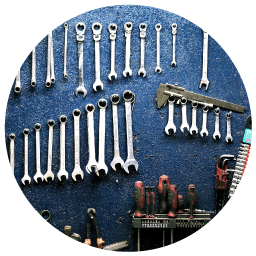Post-traumatic stress disorder, or PTSD, is a daily battle for anyone afflicted. It can affect your home life, your social life, and even your professional life. The job of a tradesman can be especially tricky when it comes to PTSD — the environment is often chaotic, always noisy, and tough conditions can make workers edgy, paving the way for conflict. These issues can be further amplified if there is an underlying addiction issue, which is quite common in those with PTSD. Fortunately, there are measures you can take to manage both your condition and addiction recovery in healthy ways while still giving a strong performance in your trade.
This guide will help you learn to understand why you may face greater risk of PTSD episodes as a tradesman, ways to prevent them, and how to handle triggers you encounter. You should never feel ashamed to seek help in managing your PTSD, so be sure to keep in touch with your doctor or counselor. Never take any medication or make any major health changes without professional guidance.
Text Advertisement
~~~~~~~~~~~~~~~~~~~~~~~~~~~~~~~~~~~~~~~~~~~~~
Checkout some really cool apps from SuperHitApps.com to help you find interesting & like minded people to meet.
~~~~~~~~~~~~~~~~~~~~~~~~~~~~~~~~~~~~~~~~~~~~~
Life Of A Tradesman
How and why your PTSD may be triggered
People develop PTSD for all kinds of reasons, be it surviving a dangerous situation, a childhood trauma, or even the unexpected death of a loved one. This, combined with the fact that each person copes with PTSD differently, means workplace triggers will be different for just about everyone. Your symptoms may appear while you’re actually working, or problems they cause at home could lead to subsequent issues at work.
A common trait in people with post-traumatic stress disorder is severe general anxiety. They may constantly be looking over their shoulder, or have an extreme reaction at an unexpected loud sound. Depending on your exact area of expertise, this could make the work environment an incredibly difficult place to be. The sudden shriek of a table saw, a burst water pipe, a sudden spark in the wire you’re trying to fix — it’s enough to make anyone a little jumpy, but with PTSD, the feeling can be impossible to shake.

If you’re working in a major construction zone, the potential for issues amplifies. There’s constant yelling and raucous noise from every direction, not to mention a need to be completely aware of your surroundings to avoid danger. For someone with PTSD — who may not have slept the night before — this can make concentrating a major challenge. For some, it can even cause memory problems, which can be especially troublesome if you’re new to the job.
Whether you’re working on a large-scale project with dozens of other people or are individually contracted to work on someone’s home, interpersonal relations are an important part of the job. If people are generally aware of the trauma you went through, they may able to recognize your PTSD symptoms and accommodate as they can, but even so you could still run into conflict. For example, your client may intend to simply stop by to check in on progress, but to you it may feel more like a criticism of your ability to stay on schedule.
The jarring sound of a mishandled tool hitting the ground may startle you so much that you lash out at the coworker who dropped it, leading to an unproductive argument. There’s also the risk of turning a simple difference of opinion into an altercation; if there’s a coworker you normally don’t get along with, any disagreements could easily escalate into major fights, potentially even physical ones.
If your clients or colleagues are completely unaware of your situation, it can lead to even greater problems. First, if they have no reason to believe you might be somewhat sensitive, they can’t actively take steps to avoid problems before they start. Second, if there is a situation where your PTSD symptoms come into play, they may not be as willing to step back and walk away, leading to potentially explosive conflict. Finally, even if the dispute gets resolved, they may not be able to shake off your extreme reaction as heat-of-the-moment.
This kind of unstable environment may even lead to flashbacks, which can be overwhelming and debilitating for many with PTSD. As you begin to identify what triggers you into episodes, to some extent you may be able to avoid these situations. For a recently-retired Army vet who spent several years in Afghanistan, the sound of a nail gun could unexpectedly trigger memories of gunfire and send his or her mind right back overseas. An abuse survivor could be so alarmed by unanticipated — albeit harmless — physical contact that he or she loses all sense of personal security.

Unfortunately, the inconsistency with triggers and symptoms is part of what makes PTSD so complex. It will be difficult to predict exactly how, when, or even if your symptoms will affect your work. It’s important to consider your personal situation, including your trade, typical day-to-day job duties, relationship with your direct supervisor and coworkers, and the kind of trauma you’re coping with. But whether you’re an electrician, construction worker, plumber, carpenter, or any other type of tradesman, there are ways to reduce your episodes in the workplace. You can even find ways to effectively bounce back from them when they’re unavoidable.
Preventing and Overcoming PTSD Symptoms At Work
There are many ways to reduce PTSD episodes in the workplace.
Deciding whether or not to disclose your post-traumatic stress syndrome with your employer is a personal choice; never feel that you must. There are important considerations to make before approaching your boss about your condition:

HOW SUPPORTIVE IS THE PERSON LIKELY TO BE?
If you have a pretty strong relationship with your direct supervisor, you may feel confident that he or she will be understanding and have your back. On the other hand, if you’ve noticed they tend to be flippant about mental health issues, you may be hesitant to talk to them. If you’re not sure either way, ask a trusted colleague if they’ve ever had to approach the boss about a personal problem and how it was handled. You don’t have to give them the details, but it can be a helpful clue to how he would respond if you went to them.
WHAT TYPE OF COMPANY CULTURE IS THERE?
Unfortunately, there tends to be a stigma when it comes to mental health. Some companies believe “personal problems” should stay at home and never interfere at work. Others may provide excellent psychological benefits for employees. Keep in mind that even if a company has historically been somewhat unaccommodating in these situations, it may have stemmed from misinformation or misunderstanding; it doesn’t mean your superiors won’t look out for your best interests.
DO YOU NEED TO DISCLOSE EVERYTHING, OR SHOULD YOU BE SELECTIVE?
Again, you are absolutely not required to disclose your PTSD unless you choose to do so. Similarly, if you do decide to have a conversation with your boss, you don’t necessarily have to tell him or her every detail. If you’re struggling with horrific nightmares after losing your spouse in a car accident but don’t feel comfortable mentioning PTSD, be honest: tell your boss you’re having a very difficult time coping with your loss and it’s affecting your sleep. Many managers will be empathetic and try to help you any way they can, but first they have to know there’s a problem.
Weigh the pros and cons of telling your employer about your PTSD and make the decision that makes you most comfortable. You may also want to consider whether or not you’ll let your colleagues know. If you work with the same people every day and trust them, it may help to clue them in. Not only will they be mindful of it on the job, it may help to go to work without feeling like you’re keeping a secret. However, if you aren’t particularly close with your coworkers, you may not feel comfortable. Don’t rush into any decisions before you’re ready — when the time comes, you’ll know for yourself.
Recognizing The Triggers

Your best shot at preventing episodes at work is to identify what it is that triggers you. Loud noises? Surprises? Yelling? A certain object? A song? Write them down and keep them on you at all times. You may absent-mindedly go to perform a task that never would have affected you six months ago but now sets off painful memories, so it could help to have a constant reminder of what to avoid. If you aren’t sure what your triggers are just yet, create a trigger table where you note down every instance of symptoms. You’ll be able to see patterns over time, and eventually it will be much easier to identify what’s causing your episodes.
Once you know what to avoid, do so as much as possible. Avoid particularly stressful situations, including coworkers you butt heads with. You could talk to your boss about switching from working inside the building — where the echoes of hammering make you uneasy — to an exterior project. Or you could limit the kinds of jobs you accept as a private contractor. You could even consider adjusting your work hours; if your mood tends to decline later in the day, for example, ask your boss about coming in earlier so you can leave before the drop.
If too much noise and commotion is impairing your ability to concentrate, you may consider noise-canceling headphones. Be sure everyone is aware so you don’t miss any emergency announcements or warnings; many loud worksites use hand signals to communicate amid constant noise, but if it’s new to your group, you’ll need to establish them.

If an episode does occur despite your best efforts, take a step back and try to calm your mind. Focus on the current moment. Breathe deeply and remind yourself that you’re safe; it may help to open your eyes and look around to prove to yourself the where and when of your current situation. Don’t let the intrusive thoughts get to you — you willsurvive this episode.
If your symptoms are still giving you problems after a few minutes, take a short break. It may help to go outside for some fresh air and sunshine, or even a walk around the block. You can listen to soothing music on your phone, practice some relaxation techniques, or write in a journal. If you’re able to give your partner (or another confidante) a quick call, take the opportunity to vent.
If it’s your actual task that’s overwhelming you into an episode, look at it from a different angle. Is there a better way to do it? Can you break it up into smaller steps? Ask your manager if he’s got any ideas — again, you don’t have to mention that your PTSD is coming into play. Instead, simply say you’re looking for a way to be more efficient and need a fresh perspective.
Whether it’s stress from work, your PTSD, or a combination of both, it’s incredibly important to cope with stress in healthy ways. Even if you haven’t previously had any substance useissues in the past, you should be careful not to start any destructive habits like binge drinking or turning to drugs to numb the pain. Drugs and alcohol may temporarily make symptoms subside, but ultimately will only exacerbate them. Substance abuse can deepen already unbearable depression, increase dangerous or risky behavior, and even lead to suicidal thoughts.
If you feel that your aversion to drinking puts you at a disadvantage with coworker relations — for example, your crew may like to go to happy hour on Fridays — see about planning dry events. Instead of happy hour, go bowling or blow off some steam at the go-kart track. There are plenty of ways to bond with coworkers that don’t involve alcohol, and no one has to know why you choose to abstain. You may even find that some of your colleagues will embrace a dry event, especially if families are invited to join!

Unfortunately, the inconsistency with triggers and symptoms is part of what makes PTSD so complex. It will be difficult to predict exactly how, when, or even if your symptoms will affect your work. It’s important to consider your personal situation, including your trade, typical day-to-day job duties, relationship with your direct supervisor and coworkers, and the kind of trauma you’re coping with. But whether you’re an electrician, construction worker, plumber, carpenter, or any other type of tradesman, there are ways to reduce your episodes in the workplace. You can even find ways to effectively bounce back from them when they’re unavoidable.
If your PTSD continues to impair your work life no matter what you do, make an appointment with your doctor or counselor to specifically address that issue. Don’t plan to bring it up at your next scheduled appointment or call when you “get time.” He or she may know of an effective therapy, medication, or other course of treatment you’ll need his or her guidance for, and the sooner you contact them, the sooner you can get back on track.
Another important part of coping with PTSD is to avoid shaming yourself for being afflicted. Build a strong support system at home, and try to let your loved ones be there for you as much as you can. Seek out support groups in your community, or even find an online outlet where you can talk to others who completely understand what you’re going through. There are millions of people who are learning to bounce back from a battle with PTSD — you are not alone, and you can conquer it.
Contact PhoenixGMN or PhoenixInfomedia.in for all your App & Web development needs. Other services include – SEO, Online Promotion, Digital Marketing, App Explainer Videos, eShops & much more. Checkout Our Handpicked Apps Portfolio & Videos here – superhitapps.com/ux-and-videos


